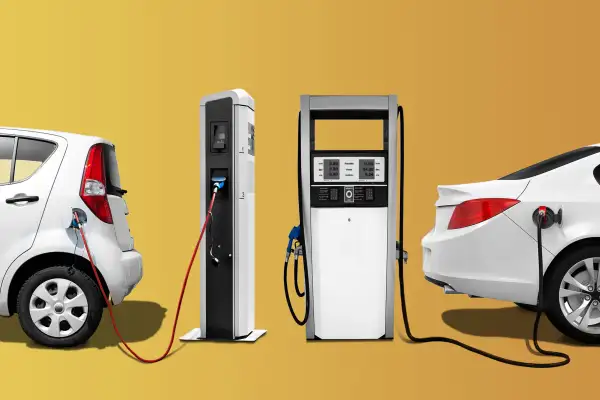The Push for Electric Vehicles Could Affect How Much Your Next Car Costs

President Joe Biden just announced that by 2030 he wants at least 50% of the cars sold in the U.S. to be electric vehicles.
Right now, relatively few of the cars on U.S. roads are electric. They make up only about 3% of new car sales, and Tesla accounts for 55% of those transactions.
Why haven't more people switched from gas-powered cars to EVs? Would-be buyers often cite concerns about running out of power and not having access to a car-charging station. Higher initial upfront costs for electric cars cause people to pause as well (many of those new Teslas cost over $70,000).
But the initial vehicle price is only one part of the equation. How much does it cost to own an electric car in the long run, and how does that compare to traditional gas-powered vehicle ownership? Could the push by President Biden actually wind up saving money for consumers?
Though the issue is complicated, the truth is that it's often cheaper to own an electric car for the long haul. Whether you'll save money buying an electric car can vary widely, based on what model you're purchasing, how much gas (and electricity) costs where you live, the availability of tax credits (worth up to $7,500) at the time you're buying, and the price of auto insurance for your vehicle, among other factors.
How much is an electric car?
According to Kelley Blue Book, the average transaction price for an electric vehicle in April 2021 was $51,532. That's more than $11,000 higher than what you’d pay at the dealership for a full-size gas-powered car, and nearly $30,000 more than the average compact car sale.
Electric vehicle prices are moving in the right direction, though, decreasing 10%, on average, from April 2020 to April 2021. Increased pressure on automakers after Biden’s announcement on Thursday may drive prices even lower down the line.
Bear in mind that many electric cars are expensive luxury vehicles — some models go for over $100,000 — and that brings the average price up significantly. The cheapest electric cars, like the Nissan Leaf, start at under $30,000. And some electric cars don't cost that much more than their gas-powered siblings. The starting price of an electric Mini Cooper is only $7,000 more than its regular gas-powered counterpart, for example.
Electric vehicles vs. gas cars: What's cheaper to own?
Upfront costs may be higher for EVs, but these cars are also much cheaper to operate and maintain — and the savings can add up.
Over the life of your car, you will often spend less by buying electric. Fuel is the biggest and most obvious category for savings when you go electric. Owners who drive 15,000 miles in their electric car in a year spend roughly $546 on power, versus $1,255 in a gas-powered car, AAA found. Electric car owners spent around $0.03 per mile to get their car moving, which is $0.04 less than small sedan owners and $0.05 less than people with small SUVs.
Your personal savings would vary based partly on how much gas and electricity cost where you live. According to a U.S. Department of Energy study, the savings for going electric in Washington state are particularly significant. Over the course of 15 years of car ownership, the electricity needed to run a battery-powered EV could cost upwards of $14,480 less than what you'd pay for gas in a similar vehicle.
EV owners also save on maintenance costs because they don’t have to worry about oil changes or new air filters. That amounts to savings of about $330 each year.
On the other hand, auto insurance costs are often similar (and sometimes higher) for EVs. On average, you’ll spend $1,227 per year on full-coverage insurance for an electric vehicle, according to AAA. That’s compared to $1,087 per year for a small SUV and $1,342 for a small sedan. Keep in mind that higher-priced cars (including expensive EVs) generally cost a lot more to insure. Car and Driver estimates that insurance for a Tesla can often run more than $4,000 per year.
Overall, AAA estimates you'll spend $9,119 annually owning an electric vehicle that you drive for 15,000 miles in a given year. That figure includes costs related to power (electricity) and maintenance, as well as financing, registration, fees, insurance and depreciation, and it's based on fairly inexpensive EVs — specifically, BMW i3, Chevrolet Bolt, Hyundai Kona Electric, Nissan Leaf, and Tesla Model 3. For the sake of comparison, the total cost per year for a minivan that gets the same use is $10,101, while a small SUV would cost you $8,362 and a half-ton pickup would run over $11,000.
Again, the costs can vary widely based on individual circumstances. To run the numbers yourself based on the make and model you're interested in, check out an online tool like the calculator at Edmunds.com, which will estimate how much you’ll really spend on insurance, fuel, repairs, loan interest, depreciation and such.
Electric car charging stations: availability and cost
Most electric cars nowadays can go about 200 to 300 miles on a single charge, and the availability of public electric car charging stations is growing. (Currently there are 41,400 electric vehicle charging stations in the country, compared to 136,400 gas stations, CNBC has reported.) So it (theoretically) should be rare to find yourself running out of power with no vehicle chargers nearby.
And it should only get easier to find and use electric car charging stations. The infrastructure bill making its way through Congress includes $550 billion for changes including building new electric vehicle charging stations, an investment that's essential if EVs are to become widely adopted.
Many EV owners also buy their own charging stations for home use. The cost of installing one in your home varies, and if you live in a shared apartment getting one put in may be tricky. For the cheapest model, which gives you 5 miles of charge per hour a vehicle is plugged in, you’re looking at between $1,300 and $2,300 for the unit and installation, according to Carvana. More expensive models can cost up to $50,000 or more.
More on Car Insurance
Money’s Top Picks
Car Insurance Reviews Learn More |

